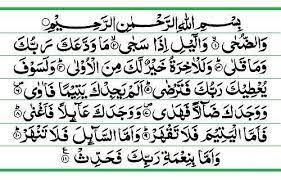Name of the Surah
Surah At-Tin was revealed in Makkah. It is called At-Tin ‘the fig’ because it begins with swearing by the fig. 95:1 By the fig and the olive,
Relationship between Surah Ash-Sharh and Surah At-Tin
Surah As-Sharh comes before surah At-Tin according to the arrangement of the written copy of the Quran. Surah Ash-Sharh mentions the conditions of the best human being, namely, Messenger Muhammad [peace be upon him]. Then, surah At-Tin mentions the conditions of human beings in general. It mentions that they will end up entering Hell and suffering its severe punishment if they disbelieve in Allah’s Oneness, or entering Paradise and enjoying its great reward if they believe in Allah’s Oneness, obey His commands, and avoid His prohibitions.
Most Important Topics Discussed in Surah At-Tin
• Surah At-Tin mentions that Allah honors human beings. He created man in the best form.
95:4 We indeed created man in the best form.
• Surah At-Tin mentions that man descends to the lowest position by disbelieving in Allah’s Oneness and denying the occurrence of the Day of Judgment.
95:5 Then We reduced him to the lowest of the low,
• Surah At-Tin mentions the absolute rule for recompensing people, namely, rewarding the believers in Allah’s Oneness and punishing the disbelievers in Allah’s Oneness.
95:6 save those who believe and do righteous deeds, for them is a reward, never-ending.
English Translation of Surah At-Tin
Revealed in Makkah, Contains 8 Ayah
Bism-Allah ar-Rahman ar-Rahim
In the Name of Allah, the Giver of Mercy, the Most Merciful
95:1 By the fig and the olive,
95:2 by the Mount Sinai,
95:3 and by this secure city.
95:4 We indeed created man in the best form.
95:5 Then We reduced him to the lowest of the low,
95:6 save those who believe and do righteous deeds, for them is a reward, never-ending.
95:7 Then, what causes you to deny the Recompense?
95:8 Is not Allah the most just of all judges?
Tafsir
95:1 By the fig and the olive,
Allah, Exalted be He, swears by the fig, which people eat, and the olive, which people press to extract oil.
Allah can swear by whatever thing of His creatures, but the created beings can only swear by Allah.
The scholars of Tafsir mention the following opinions about the meaning of the fig and the olive: 1) They refer to the fig and olive, which people use. These two products indicate Allah’s perfect ability, Who created them and made them delicious and beneficial food. 2) The fig refers to the mosque that Prophet Noah built, and the olive refers to Jerusalem. 3) The fig refers to the holy mosque in Makkah, and the olive refers to al-Aqsa mosque. 4) The fig refers to Damascus’ mosque, and the olive refers to Jerusalem. 5) The fig refers to the mountain upon which Damascus is built, and the olive refers to the mountain upon which Jerusalem is built [Zad Al-Masyr fi Ilm At-Tafsir, Imam Ibn Al-Jawzi].
After mentioning the opinions of the scholars, Imam Muhammad bin Jarir At-Tabari said, ‘The correct opinion is that the fig refers to the edible fruit, and the olive refers to the fruit from which oil is extracted. That is because these are the common meanings of them among the Arabs. It is known that there is no mountain called the fig nor the olive. However, if it is meant that Allah swears by the places where the fig and the olive grow, then it may be an acceptable opinion though there is no supporting proof for such an opinion whether in the Quran or a statement of competent authority. Besides, it is known that Damascus is the place where the fig grows, and Jerusalem is the place where the olive tree grows [Tafsir At-Tabari].’
95:2 by the Mount Sinai,
95:3 and by this secure city.
Allah, Exalted be He, swears by the Mount Sinai, which is the mount where Allah spoke to Messenger Moses. Allah also swears by the city of security, namely, Makkah, where anyone who enters it will be safe from any danger.
Allah swears by these places because they are blessed. The greatest blessing that occurred on the Mount of Sinai is that Allah spoke to Messenger Moses there. As for Makkah, Allah has made it inviolable and whoever enters it will be safe.
95:4 We indeed created man in the best form.
This ayah is the answer statement of the oath. I swear by the fig, which is a delicious fruit, the olive from which oil is extracted, the Mount of Sanai, where Moses received the divine revelation, and the secure city of Makkah, We indeed, created man in the best of form.
In other words, Allah swears by the fig, the olive, the Mount of Sanai, and the city of Makkah that He created man in the best of form. He gave him the most beautiful appearance and the most distinctive form. Besides, Allah distinguished man from all other creatures by the intellect whereby he can distinguish the truth from falsehood and the right from the wrong.
95:5 Then We reduced him to the lowest of the low,
The scholars of Tafsir have two opinions about the meaning of reducing man to the lowest of the low: 1) Growing very old after youthfulness, and becoming weak after being strong. 2) Entering Hell [Zad Al-Masyr fi Ilm At-Tafsir, Imam Ibn Al-Jawzi].
After mentioning the opinions of the scholars, Imam Muhammad bin Jarir At-Tabari said, ‘The correct opinion is that the ayah means growing very old when one becomes decrepit that he cannot understand anything. The previous ayah mentions that Allah created man in the best form. Then, he goes through different stages in his life until he becomes very old and weak. This refutes the claim of the deniers of the resurrection on the Day of Judgment. Allah says, 95:7 Then, what causes you to deny the Recompense? It means after presenting these proofs, what causes you to deny the Recompense on the Day of Judgment?’ The disbelievers deny Hell, which Allah warns that they will enter. They experience old age after youthfulness. Therefore, Allah has presented them with evidence that they can see, namely, changing man’s condition from youthfulness to old age, and power into weakness [Tafsir At-Tabari].’
Imam Ibn Kathir said, ‘95:5 Then We reduced him to the lowest of the low, this refers to entering Hell on the Day of Judgment. In other words, after enjoying fairness and beauty in the life of this world, man will enter Hell if he disobeys Allah and His Messengers. Therefore, Allah says, 95:6 save those who believe and do righteous deeds, for them is a reward, never-ending [Tafsir Ibn Kathir].’
It should be noted that not all human beings reach very old age; rather, some of them grow very old.
95:6 save those who believe and do righteous deeds, for them is a reward, never-ending.
Those who believe in Allah’s Oneness and perform righteous deeds for His sake will be recompensed immensely. Allah will give them a never-ending reward for their righteousness and patience with the afflictions and hardships that they may suffer in the life of this world.
95:7 Then, what causes you to deny the Recompense?
O man, what causes you to deny the Recompense on the Day of Judgment? Has Allah not created you in the best form? Has Allah not sent you His messengers to invite you to worship Him alone? Has Allah not made the right path clear to you?
O man, indeed, you have no excuse for disbelieving in Allah’s Oneness and denying the resurrection on the Day of Judgment. Those who are endowed with sound understanding believe in Allah’s Oneness and follow the right path.
95:8 Is not Allah the most just of all judges?
Indeed, Allah, Who created man in the best form and then He is able to reduce him to the lowest of the low, is the most just of all judges. Thus, everyone, who has a sound reason, must worship Allah alone, obey His commands, and follow His Messengers.
Qatada, may Allah have mercy on him, narrated that when Messenger Muhammad peace be upon him recited 95:8 Is not Allah the most just of all judges?, he would say, ‘Yes, indeed, Allah is the most just of all judges and I am one of those who witness to that effect [Tafsir At-Tabari].’
Learned Lessons from Surah At-Tin Ayah 1-8
• Allah, Exalted be He, can swear by the fig, the olive, the Mount Sanai, and Makkah. Allah can swear by whatever thing of His creatures, but the created being can only swear by Allah.
• Allah’s blessings on man are countless.
• Allah created man in the best form.
• Those who believe in Allah’s Oneness and perform righteous deeds will attain immense rewards from Allah.
• The disbelievers are criticized for denying the occurrence of the Day of Judgment though they know that Allah created them in the best form.
• Allah is the most just judge of all judges. He will justly recompense the good-doers and the evil-doers according to their deeds.








